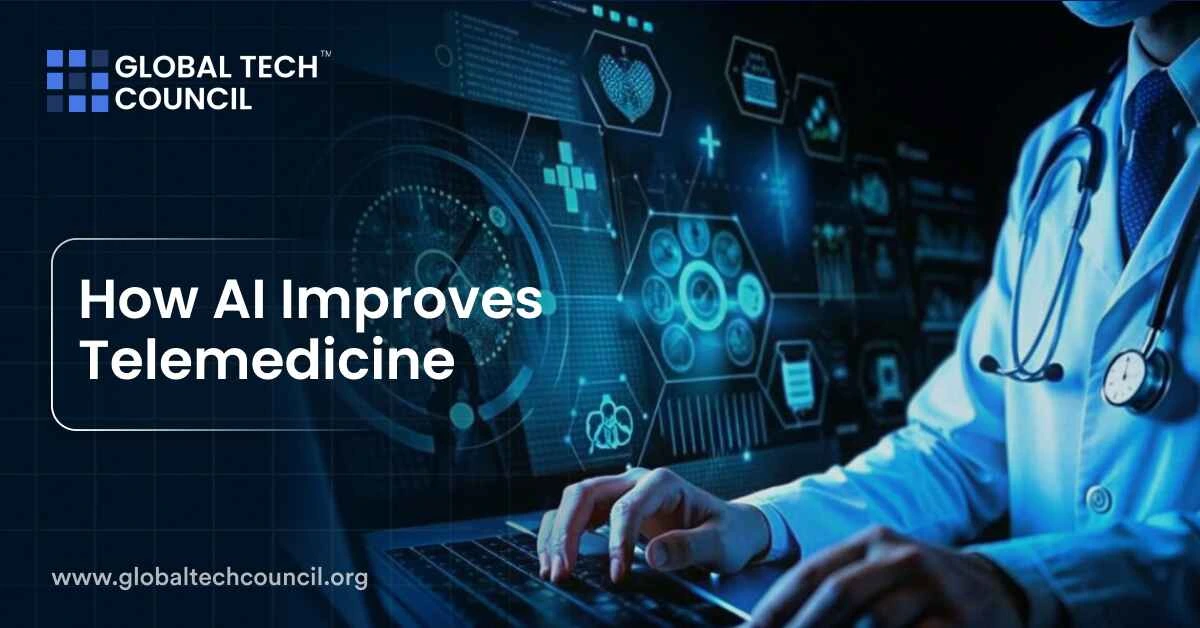
Artificial intelligence (AI) is transforming how remote medical services work. It’s making healthcare more available, dependable, and quicker. With the help of AI, medical teams can improve how they diagnose issues, create custom treatments, and closely monitor patients. These changes are particularly useful for those living in areas without sufficient medical care.
Making Diagnoses Better
AI tools are helping doctors by analyzing medical data and finding health problems faster and more accurately. For example, researchers at UCLA created a method for identifying prostate cancer. This method achieves an 84% accuracy rate, which is a big improvement over the 67% typically achieved by doctors.
The system generates detailed, three-dimensional visuals of cancer progress using patient information. These images help healthcare providers plan more targeted treatments, reducing the need for invasive tests.
In skin care, AI tools analyze pictures of skin conditions sent through mobile apps. These tools compare the pictures to large databases, flagging possible issues and directing people to medical help. This process not only speeds up detection but also expands access to care for skin-related concerns.
AI is changing the way we access healthcare through telemedicine, making it more efficient and personalized. Earning the CAIE Certified Artificial Intelligence (AI) Expert® certification can help you contribute to these innovations.
Tailoring Treatments to Each Person
AI technology allows doctors to create treatment plans that fit individual needs. By looking at a person’s health history, genetics, and habits, these systems deliver care designed specifically for them. This level of personalization often improves how well treatments work since they are based on individual requirements.
Some platforms already use AI to guide doctors in creating customized care plans. These tools help shift away from generic solutions, making medical care more specific and effective.
Improving Mental Health Services
AI is also breaking new ground in mental health care by giving timely support to individuals facing emotional struggles. For instance, chatbots can interact with users and offer immediate advice. These systems can recommend coping methods, point people to helpful resources, or suggest professional help when needed.
This type of support is available any time of the day, giving people a way to start addressing mental health issues without delay. It lowers barriers to getting help and makes care more accessible.
Tracking Patients from a Distance
Wearable gadgets paired with AI have changed how patients are monitored remotely. These devices keep track of important metrics like heart rate, oxygen levels, and blood pressure. The AI processes this data in real-time, spotting irregular patterns and sending alerts to healthcare providers.
For example, AI-driven systems can warn doctors of potential health risks early, allowing them to step in before the situation worsens.
In senior care, similar technology watches daily routines and notices unusual behavior that might indicate a health problem. Caregivers receive alerts, improving the safety and well-being of older adults.
Cutting Down on Administrative Tasks
AI isn’t only making medical treatments better—it’s also helping reduce the workload for healthcare staff. Tools that automate documentation during appointments let doctors focus more on the patients they’re treating.
Additionally, these systems handle tasks like scheduling, billing, and organizing medical records with fewer mistakes. This makes the process smoother for everyone involved, saving time and improving the overall experience.
Crafting precise AI-driven responses is vital in telemedicine for improving patient outcomes. Becoming a Certified Prompt Engineer™ equips you with skills to excel in this growing field.
Bringing Healthcare to More Communities
AI-based platforms are helping areas with limited medical services by bridging the gap in healthcare access. Virtual consultations allow patients to connect with medical professionals without needing to travel far. AI tools can also assist with initial diagnoses and patient monitoring, making it possible for many to get care at home.
For example, in China, a modern medical center uses robotic doctors to serve thousands of patients daily. This approach not only makes care more affordable but also helps train new medical staff. Systems like this can also help predict disease outbreaks, benefiting public health planning and preparation.
Overcoming Challenges
Despite its many benefits, using AI in healthcare isn’t without challenges. Protecting patient privacy is one of the biggest concerns since medical records are highly sensitive. Developers and healthcare providers must work hard to ensure data stays secure.
Another challenge is ensuring AI systems are unbiased and accurate. Mistakes in the data or errors in the programming could result in incorrect conclusions or inappropriate care. To address this, developers need to test AI tools thoroughly and meet strict guidelines before launching them. Collaboration with licensed professionals is also necessary to build trust in these technologies.
AI developers play a key role in building telemedicine platforms that connect patients and doctors seamlessly. The Certified Artificial Intelligence (AI) Developer® credential can help you step into this transformative role.
Wrapping Up
AI is changing how healthcare works remotely, offering improved diagnoses, more personalized treatments, and easier processes. As technology continues to develop, it will allow healthcare providers to reach more people regardless of where they live. These innovations are making healthcare more accessible, improving the quality of care, and positively influencing lives across the world.